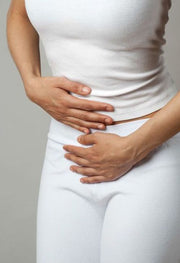
Is it bloating... or is it normal?
Bloating is different to the normal stomach volume increase due to the volume of food consumed. However, when your stomach feels hard, you have abdominal pain and discomfort, and possibly gas - that is considered bloating. And this, especially on a frequent basis, is definitely not normal.

Bloating Myths Debunked!
Myth #1: Bloating must be caused by something I ate.Many different factors can cause bloating, not just something you ate. It definitely could have been what you ate, but it could also be due to things like poor digestion, tight clothes, stress or more!
Myth #2: A low FODMAP diet will cure bloating.
A low FODMAP diet may initially reduce bloating, if the FODMAPs are to blame. However, the low FODMAP diet should only be short-term, and should be used in conjunction with identifying why you’re reacting to those foods and repairing the gut to restore proper digestive function.
Bloating is uncomfortable, yes, but more seriously - it can be a sign that something isn’t right with your digestive system. These are some signs that your bloating could be considered abnormal and warrant further investigation:
- Bloating consistently - it seems like no matter when you eat or what you eat
- Bloating even if you skip a meal or fast
- Bloating after certain foods
- Waking up first thing in the morning being bloated
- Bloating worsens around your period
Common underlying causes of bloating
- Food intolerances or sensitivities
- Chronic constipation (not moving your bowels at least 1-2 times per day)
- Hormonal issues
- Low stomach acid
- Stress
- Medication side effects
- Coeliac disease
- Gut infections or dysbiosis
- Poor liver function
Tips on how to reduce stomach bloating
-
Avoid drinking liquids during your meals - this may be affecting your digestion! Wait 20 minutes before or after food
-
Be more mindful about your eating habits. Eat when you are relaxed - don’t eat on the run or when you are in a rush!
-
Chew your food well. This will help your body to produce the digestive juices needed to digest your food!
-
Avoid food that you know triggers you
-
Reduce stimulants and caffeine
If you feel something's not quite right, listen to your gut (literally!) and keep searching for answers. You don’t have to suffer forever!

By Breeanna Betar
Breeanna is a degree qualified Clinical Nutritionist specialising in women’s health. In her private clinic, she works one on one with women to help them achieve their health goals. Bree possesses a profound understanding of women’s health needs and is committed to sharing her knowledge with the Naked Harvest community, and is proud to be involved in Naked Harvest’s mission of revolutionising the active supplement industry.
![[Nav_Category_shop-all.jpg] SHOP ALL](http://www.nakedharvestsupplements.com/cdn/shop/files/Nav_Category_shop-all_medium.jpg?v=229551162107522660)
![[Nav_Category_protein.jpg] PLANT PROTEIN](http://www.nakedharvestsupplements.com/cdn/shop/files/Nav_Category_protein_medium.jpg?v=3001415470058422894)
![[Nav_Category_pre.jpg] NATURAL PRE-WORKOUT](http://www.nakedharvestsupplements.com/cdn/shop/files/Nav_Category_pre_medium.jpg?v=6814586239177681891)
![[Nav_Category_electrolytes_v2.jpg] ELECTROLYTES](http://www.nakedharvestsupplements.com/cdn/shop/files/Nav_Category_electrolytes_v2_medium.jpg?v=8085001776675848411)
![[Nav_Category_moonmylk.jpg] BEDTIME HOT CHOCOLATE](http://www.nakedharvestsupplements.com/cdn/shop/files/Nav_Category_moonmylk_medium.jpg?v=12631405938823957710)
![[Nav_Category_Creatine.jpg] CREATINE](http://www.nakedharvestsupplements.com/cdn/shop/files/Nav_Category_Creatine_medium.jpg?v=5379326253006347654)
![[Nav_Category_Matcha.jpg] MATCHA & CHAI](http://www.nakedharvestsupplements.com/cdn/shop/files/Nav_Category_Matcha_medium.jpg?v=12528052245834137118)
![[Nav_Category_wellness.jpg] GORGEOUS GREENS](http://www.nakedharvestsupplements.com/cdn/shop/files/Nav_Category_wellness_medium.jpg?v=12528176088121862281)
![[Collagen_category.jpg] COLLAGEN](http://www.nakedharvestsupplements.com/cdn/shop/files/Collagen_category_medium.jpg?v=7874986955741861029)
![[Nav_Category_onthego.jpg] ON-THE-GO](http://www.nakedharvestsupplements.com/cdn/shop/files/Nav_Category_onthego_medium.jpg?v=9258968730903582129)
![[Nav_Category_accessories.jpg] ACCESSORIES](http://www.nakedharvestsupplements.com/cdn/shop/files/Nav_Category_accessories_medium.jpg?v=8748347510610747858)
![[Nav_Category_samples.jpg] SAMPLES](http://www.nakedharvestsupplements.com/cdn/shop/files/Nav_Category_samples_medium.jpg?v=12269696752583776743)
![[Nav_Category_giftcard.jpg] GIFT CARDS](http://www.nakedharvestsupplements.com/cdn/shop/files/Nav_Category_giftcard_medium.jpg?v=1625935370118938582)
![[Nav_Category_pilates.jpg] Yoga/Pilates](http://www.nakedharvestsupplements.com/cdn/shop/files/Nav_Category_pilates_medium.jpg?v=13143021470193189408)
![[Nav_Category_high-intensity.jpg] High Intensity](http://www.nakedharvestsupplements.com/cdn/shop/files/Nav_Category_high-intensity_medium.jpg?v=1128519081117118136)
![[Nav_Category_low-intensity.jpg] Lifestyle](http://www.nakedharvestsupplements.com/cdn/shop/files/Nav_Category_low-intensity_medium.jpg?v=9882188842252146182)
![[Nav_Category_strength.jpg] Strength Training](http://www.nakedharvestsupplements.com/cdn/shop/files/Nav_Category_strength_medium.jpg?v=12070627897078322724)






